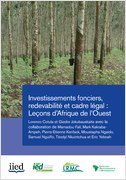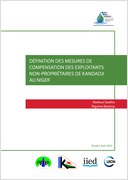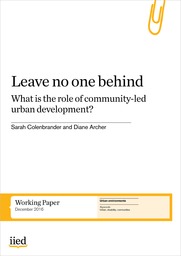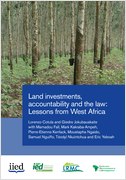Focal point
Location
Mission
Our mission is to build a fairer, more sustainable world, using evidence, action and influence in partnership with others.
Who we are
IIED is one of the world’s most influential international development and environment policy research organisations. Founded in 1971 by economist Barbara Ward, who forged the concept and cause of sustainable development, we work with partners on five continents. We build bridges between policy and practice, rich and poor communities, the government and private sector, and across diverse interest groups. We contribute to many international policy processes and frameworks, including the Intergovernmental Panel on Climate Change, the Millennium Ecosystem Assessment and the UN conventions on climate change and biological diversity.
What we do
IIED carries out research, advice and advocacy work. We carry out action research — generating robust evidence and know-how that is informed by a practical perspective acquired through hands-on research with grassroots partners — and we publish in journals and maintain high research standards. We advise government, business and development agencies, and we argue for changes in public policy. We focus on bottom-up solutions, stay open to flexible, adaptable solutions and are marked by a tradition of challenging conventional wisdom through original thinking.
Resources
Displaying 151 - 155 of 367Investissements fonciers redevabilité et cadre légal : leçons d’Afrique de l’ouest
Source: IIED
La récente vague de transactions foncières à grande échelle née des investissements agro-industriels a mis en lumière une demande généralisée en faveur d’une redevabilité accrue en matière de gouvernance des terres et des investissements. Les cadres légaux influencent les possibilités de reddition de comptes et le recours à la loi a figuré dans les réponses des communautés locales aux transactions foncières.
Définition des mesures de compensation des exploitants non-propriétaires de Kandadji au Niger
Leave no one behind: what is the role of community-led urban development?
By 2050, two-thirds of people worldwide will live in urban areas. Many city dwellers in the global South live in informal settlements, without access to basic services. The global Sustainable Development Goals seek to redress this inequity with an overarching aim to ‘leave no one behind’. This paper examines what organised low-income community networks are already doing to ensure no one is ‘left behind’ in urban development.
Land investments, accountability and the law: Lessons from West Africa
The recent wave of land deals for agribusiness investments has highlighted the widespread demand for greater accountability in the governance of land and investment. Legal frameworks influence opportunities for accountability, and recourse to law has featured prominently in grassroots responses to the land deals.
Securing land tenure for farmers in the Sélingué and Maninkoura irrigation schemes
This study presents the results of field interviews with farmers, managers and the private sector from the Sélingué and Maninkoura (Mali) irrigation schemes to discuss how the current terms and conditions of the farming contract are implemented. These interviews focused on the functioning of the land management system as perceived by the stakeholders. The aim was to discuss the necessary and possible reforms of land tenure security which might allow a better development of smallholder farms.








